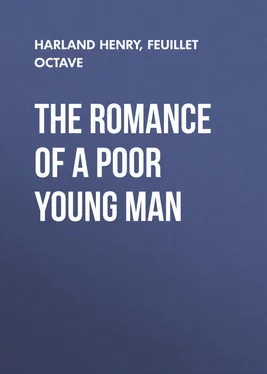Henry Harland - The Romance of a Poor Young Man
Здесь есть возможность читать онлайн «Henry Harland - The Romance of a Poor Young Man» — ознакомительный отрывок электронной книги совершенно бесплатно, а после прочтения отрывка купить полную версию. В некоторых случаях можно слушать аудио, скачать через торрент в формате fb2 и присутствует краткое содержание. Жанр: foreign_antique, foreign_prose, на английском языке. Описание произведения, (предисловие) а так же отзывы посетителей доступны на портале библиотеки ЛибКат.
- Название:The Romance of a Poor Young Man
- Автор:
- Жанр:
- Год:неизвестен
- ISBN:нет данных
- Рейтинг книги:5 / 5. Голосов: 1
-
Избранное:Добавить в избранное
- Отзывы:
-
Ваша оценка:
- 100
- 1
- 2
- 3
- 4
- 5
The Romance of a Poor Young Man: краткое содержание, описание и аннотация
Предлагаем к чтению аннотацию, описание, краткое содержание или предисловие (зависит от того, что написал сам автор книги «The Romance of a Poor Young Man»). Если вы не нашли необходимую информацию о книге — напишите в комментариях, мы постараемся отыскать её.
The Romance of a Poor Young Man — читать онлайн ознакомительный отрывок
Ниже представлен текст книги, разбитый по страницам. Система сохранения места последней прочитанной страницы, позволяет с удобством читать онлайн бесплатно книгу «The Romance of a Poor Young Man», без необходимости каждый раз заново искать на чём Вы остановились. Поставьте закладку, и сможете в любой момент перейти на страницу, на которой закончили чтение.
Интервал:
Закладка:
THE ROMANCE OF A POOR YOUNG MAN
The second evening I have passed in this miserable room, staring gloomily at the bare hearth, hearing the dull monotone of the street, and feeling more lonely, more forsaken, and nearer to despair in the heart of this great city than a ship-wrecked man shivering on a broken plank in mid-ocean.
I have done with cowardice. I will look my destiny in the face till it loses its spectral air. I will open my sorrowful heart to the one confidant whose pity will not hurt, to that pale last friend who looks back at me from the glass. I will write down my thoughts and my life, not in trivial and childish detail, but without serious omissions, and above all without lies. I shall love my journal; it will be a brotherly echo to cheat my loneliness, and at the same time a second conscience warning me not to allow anything to enter into my life which I dare not write down calmly with my own hand.
Now, with sad eagerness I search the past for the facts and incidents which should have long since enlightened me, had not filial respect, habit, and the indifference of a happy idler blinded me. I understand now my mother's deep and constant melancholy; I understand her distaste for society, and why she wore that plain, unvaried dress which sometimes called forth sarcasms, sometimes wrath from my father. – "You look like a servant," he would say to her.
I could not but be conscious that our family life was broken by more serious quarrels, though I was never an actual witness of them. All I heard were my father's sharp and imperious tones, the murmur of a pleading voice, and stifled sobs. These outbursts I attributed to my father's violent and fruitless attempts to revive in my mother the taste for the elegant and brilliant life which she had once enjoyed as much as becomes a virtuous woman, but into which she now accompanied my father with a repugnance that grew stronger every day. After such crises, my father nearly always ran off to buy some costly trinket which my mother found in her table-napkin at dinner, and never wore. One day in the middle of winter she received a large box of rare flowers from Paris; she thanked my father warmly, but directly he had left the room, I saw her slightly raise her shoulders and look up to heaven with an expression of hopeless despair.
During my childhood and early youth I had a great respect for my father, but not much affection. Indeed, throughout this period I saw only the sombre side of his character – the one side that showed itself in domestic life, for which he was not fitted. Later, when I was old enough to go out with him, I was surprised and charmed to find in him a person perfectly new to me. It seemed as if, in our old family house, he felt himself constrained by some fatal spell; once beyond its doors, his forehead cleared, his chest expanded, and he was young again. "Now, Maxime," he would cry, "now for a gallop!" And joyously we would rush along. His shouts of youthful pleasure, his enthusiasm, his fantastic wit, his bursts of feeling, charmed my young heart, and I longed to bring something of all this back to my poor mother, forgotten in her corner at home. I began to love my father; and when I saw all the sympathetic qualities of his brilliant nature displayed in all the functions of social life – at hunts and races, balls and dinners – my fondness for him became an actual admiration. A perfect horseman, a dazzling talker, a bold gambler, daring and open-handed, he became for me the finished type of manly grace and chivalrous nobility. Indeed, he would speak of himself – smiling with some bitterness – as the last of the gentlemen.
Such was my father in society; but as soon as he returned to his home my mother and I saw only a restless, morose, and violent old man.
My father's outbursts to a creature so sweet and delicate as my mother would certainly have revolted me had they not been followed by the quick returns of tenderness and the redoubled attentions I have mentioned. Justified in my eyes by these proofs of penitence, my father seemed to be only a naturally kind, warm-hearted man sometimes irritated beyond endurance by an obstinate and systematic opposition to all his tastes and preferences. I thought my mother was suffering from some nervous derangement. My father gave me to understand so, though, and as I thought very properly, he only referred to this subject with great reserve.
I could not understand what were my mother's feelings towards my father; they were – for me – beyond analysis or definition. Sometimes a strange severity glittered in the looks she fixed on him; but it was only a flash, and the next moment her beautiful soft eyes and her unchanged face showed nothing but tender devotion and passionate submission.
My mother had been married at fifteen, and I was nearly twenty-two when my sister, my poor Hélène, was born. One morning soon afterwards my father came out of my mother's room looking anxious. He signed to me to follow him into the garden.
"Maxime," he said, after walking in silence for a little, "your mother gets stranger and stranger."
"She is so ill just now, father."
"Yes, of course. But now she has the oddest fancy: she wants you to study law."
"Law! What! Does my mother want me, at my age, with my birth and position, to sit among school-boys on the forms of a college classroom? It is absurd."
"So I think," said my father dryly, "but your mother is ill, and – there's no more to be said."
I was a young puppy then, puffed up by my name, my importance, and my little drawing-room successes; but I was sound at heart, and I worshipped my mother, with whom I had lived for twenty years in the closest intimacy possible between two human souls. I hastened to assure her of my obedience; she thanked me with a sad smile and made me kiss my sister who was sleeping on her lap.
We lived about a mile and a half from Grenoble, so I could attend the law classes at the university without leaving home. Day by day my mother followed my progress with such intense and persistent interest that I could not help thinking that she had some stronger motive than the fancy of an invalid; that perhaps my father's hatred and contempt for the practical and tedious side of life might have brought about a certain embarrassment in our affairs which, my mother thought, a knowledge of law and a business training would enable me to put right. This explanation did not satisfy me. No doubt my father had often complained bitterly of our losses during the Revolution, but his complaints had long ceased, and I had never thought them well-founded, because, as far as I could see, our position was in every way satisfactory.
We lived near Grenoble in our hereditary château, which was famous in our country as an aristocratic and lordly dwelling. My father and I have often shot or hunted for a whole day without going off our own land or out of our own woods. Our stables were vast, and filled with expensive horses of which my father was very fond and very proud. Besides, we had a town-house in Paris on the Boulevard des Capucines, where comfortable quarters were always reserved for occasional visits. And nothing in our ordinary way of living could suggest either a small income or close management. Even as regards the table, my father insisted upon a particular degree of delicacy and refinement.
My mother's health declined almost imperceptibly. In time there came an alteration in her disposition. The mouth which, at all events in my presence, had spoken only kind words, grew bitter and aggressive. Every step I took beyond the house provoked a sarcasm. My father was not spared, and bore these attacks with a patience that seemed to me exemplary, but he got more and more into the habit of living away from home. He told me that he must have distraction and amusement. He always wanted me to go with him, and my love of pleasure, and the eagerness of youth, and, to speak truly, my lack of moral courage, made me obey him too readily.
Читать дальшеИнтервал:
Закладка:
Похожие книги на «The Romance of a Poor Young Man»
Представляем Вашему вниманию похожие книги на «The Romance of a Poor Young Man» списком для выбора. Мы отобрали схожую по названию и смыслу литературу в надежде предоставить читателям больше вариантов отыскать новые, интересные, ещё непрочитанные произведения.
Обсуждение, отзывы о книге «The Romance of a Poor Young Man» и просто собственные мнения читателей. Оставьте ваши комментарии, напишите, что Вы думаете о произведении, его смысле или главных героях. Укажите что конкретно понравилось, а что нет, и почему Вы так считаете.












